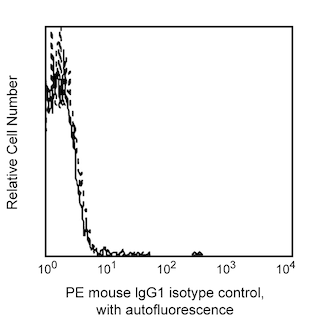-
Your selected country is
Middle East / Africa
- Change country/language
Old Browser
This page has been recently translated and is available in French now.
Looks like you're visiting us from {countryName}.
Would you like to stay on the current country site or be switched to your country?


.png)

Flow cytometric analysis of CD81 expression on human peripheral blood lymphocytes. Whole blood was stained with either PE Mouse IgG1, κ Isotype Control (Cat. No. 555749; dashed line histogram) or PE Mouse Anti-Human CD81 (Cat. No. 555676/561957; solid line histogram). Erythrocytes were lysed with BD Pharm Lyse™ Lysing Buffer (Cat. No. 555899). Fluorescent histograms were derived from gated events with the side and forward light-scattering characteristics of viable lymphocytes. Flow cytometry was performed on a BD FACScan™ system.
.png)

BD Pharmingen™ PE Mouse Anti-Human CD81
.png)
Regulatory Status Legend
Any use of products other than the permitted use without the express written authorization of Becton, Dickinson and Company is strictly prohibited.
Preparation And Storage
Product Notices
- This reagent has been pre-diluted for use at the recommended Volume per Test. We typically use 1 × 10^6 cells in a 100-µl experimental sample (a test).
- An isotype control should be used at the same concentration as the antibody of interest.
- Source of all serum proteins is from USDA inspected abattoirs located in the United States.
- Caution: Sodium azide yields highly toxic hydrazoic acid under acidic conditions. Dilute azide compounds in running water before discarding to avoid accumulation of potentially explosive deposits in plumbing.
- For fluorochrome spectra and suitable instrument settings, please refer to our Multicolor Flow Cytometry web page at www.bdbiosciences.com/colors.
- Species cross-reactivity detected in product development may not have been confirmed on every format and/or application.
- Please refer to www.bdbiosciences.com/us/s/resources for technical protocols.
The JS-81 monoclonal antibody specifically binds to CD81, which is also known as, Target of the antiproliferative antibody 1 (TAPA1, TAPA-1), or Tetraspanin-28 (Tspan-28/TSPAN28). CD81 is an ~26 kDa transmembrane protein that belongs to the tetraspanin (TM4SF) family. It is involved in cell growth and signal transduction. CD81 has a very broad cellular distribution, being expressed on cells of hematopoietic, neuroectodermal and mesenchymal origin. In hematopoietic cells, the CD81 antigen is expressed on B and T lymphocytes, NK cells, thymocytes, eosinophils, germinal center follicular dendritic cells, and to a variable extent on monocytes. The CD81 antigen is not expressed on neutrophils, platelets, or erythrocytes. CD81-specific antibodies have been shown to have anti-proliferative effects on different lymphoid cell lines, particularly those derived from large cell lymphomas. They are also reported to induce homotypic cell aggregation. Immunoprecipitation studies reveal that CD81 is a component of a multimolecular complex of CD19, CD21, and CD225 that is involved in the activation and control of B cell growth.

Development References (4)
-
Bradbury LE, Kansas GS, Levy S, Evans RL, Tedder TF. The CD19/CD21 signal transducing complex of human B lymphocytes includes the target of antiproliferative antibody-1 and Leu-13 molecules. J Immunol. 1992; 149(9):2841-2850. (Biology). View Reference
-
Lin G-X, Yang X, Hollemweguer E, et al. Cross-reactivity of CD antibodies in eight animal species. In: Mason D. David Mason .. et al., ed. Leucocyte typing VII : white cell differentiation antigens : proceedings of the Seventh International Workshop and Conference held in Harrogate, United Kingdom. Oxford: Oxford University Press; 2002:519-523.
-
Oren R, Takahashi S, Doss C, Levy R, Levy S. TAPA-1, the target of an antiproliferative antibody, defines a new family of transmembrane proteins. Mol Cell Biol. 1990; 10(8):4007-4015. (Biology). View Reference
-
Schick MR, Levy S. The TAPA-1 molecule is associated on the surface of B cells with HLA-DR molecules. J Immunol. 1993; 151(8):4090-4097. (Biology). View Reference
Please refer to Support Documents for Quality Certificates
Global - Refer to manufacturer's instructions for use and related User Manuals and Technical data sheets before using this products as described
Comparisons, where applicable, are made against older BD Technology, manual methods or are general performance claims. Comparisons are not made against non-BD technologies, unless otherwise noted.
For Research Use Only. Not for use in diagnostic or therapeutic procedures.
Report a Site Issue
This form is intended to help us improve our website experience. For other support, please visit our Contact Us page.
